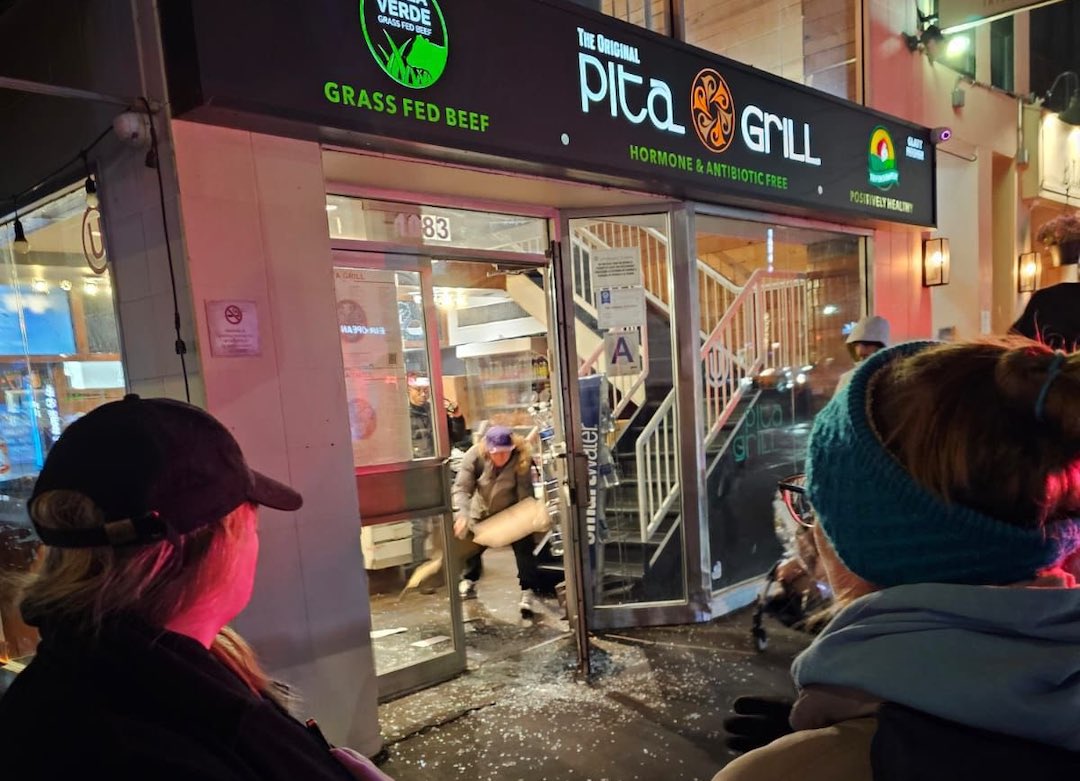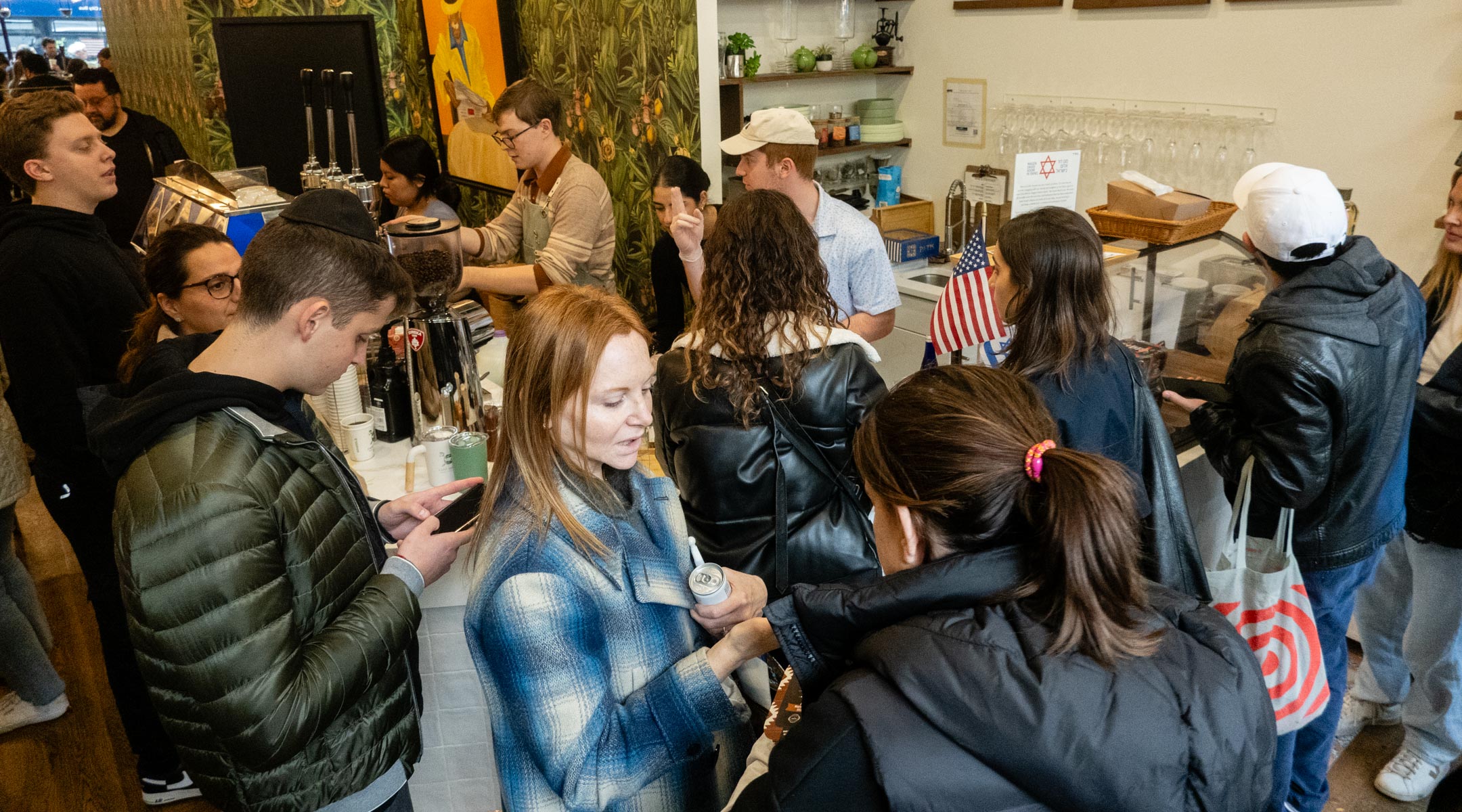Hate or just a crime? Either way, Jewish restaurants are finding support after vandalism
A series of kosher restaurants nationwide have seen outpourings of public support in the wake of vandalism or break-ins since Hamas’ Oct. 7 attack on Israel

Pita Grill, on Manhattan’s Upper East Side, was attacked in late November. Police do not believe it was a hate crime. (Twitter/X)
(JTA) — On a Saturday in late November, vandals smashed the front entrance of Pita Grill, a kosher restaurant in New York’s Upper East Side, and stole e-bikes in front of the restaurant.
Law enforcement quickly concluded that it was not a hate crime, but a standard robbery. The restaurant was closed for Shabbat at the time of the break-in. But rumors quickly swirled that the Middle Eastern eatery was the target of an antisemitic attack. Prominent Jewish influencers shared videos of the attack on social media and asked followers to support the restaurant. Many showed up.
“We never know people’s motives and if their intention was, ‘Oh, this is a kosher restaurant, there’s a scooter there, I’m gonna take advantage and hurt them and this is a good target,’” Elan Kornblum, creator of the 98,000-member Facebook group Great Kosher Restaurant Foodies, told the Jewish Telegraphic Agency.
“We’re kind of walking around thinking that people are out to get us and if there’s a crime that it must be antisemitic,” he added. “We’re all on edge.”
Pita Grill, which did not respond to JTA requests for comment, is one of a series of kosher restaurants nationwide that have seen outpourings of public support in the wake of vandalism or break-ins since Hamas’ Oct. 7 attack on Israel, which triggered a spike in antisemitic incidents around the world. Law enforcement has concluded that some of these incidents were hate crimes, while others were not. Still others are under investigation.
Some of the incidents are clearly antisemitic in nature. A string of restaurant attacks has drawn widespread attention over the past two months. 2nd Avenue Deli, a kosher restaurant on Manhattan’s Upper East Side, was vandalized with a swastika in late October. Canter’s Deli in Los Angeles was also vandalized with a swastika, launching a hate crime investigation by the Los Angeles Police Department. Earlier this week, pro-Palestinian protesters in Philadelphia accused a falafel restaurant of “genocide.”
Other attacks have fallen in a vast gray area where the question of antisemitism may be in the eye of the beholder. Caffe Aronne, also on the Upper East Side, saw a bump in business after reports that baristas quit en masse over the war — though what actually took place appears to be murkier.
And a kosher pizza restaurant in Skokie, Illinois was tagged with a symbol that included a swastika in it; law enforcement later contended that it was not a hate crime because it was a gang symbol belonging to the Maniac Latin Disciples, a street gang from Chicago founded in the 1960s by someone named Albert “King Hitler” Hernandez. The restaurant did not return JTA calls for comment.
At Sushi Tokyo, a kosher eatery in Manhattan’s Chelsea neighborhood, a vandal threw a chair past a waiter wearing a kippah and smashed a window of an outdoor dining shed. The incident is still under investigation, but one patron of the restaurant said she felt a climate of fear there.
“I noticed everyone is in caps, hiding their yarmulkes, which people would not normally do,” said Adie Horowitz, who went to Sushi Tokyo with a friend following the vandalism in order to show support.
Rachel Sass, an analyst at the ADL Center on Extremism, explained that Jews’ personal experience of antisemitism doesn’t always match up with what law enforcement concludes. Even if an incident isn’t a hate crime, she suggested, it may feel like a hate crime.
“We’re trying to see and hear and represent the feelings of our constituency, which we consider to be the entire Jewish community in the United States,” she said. “We try to really hear and reflect and validate these feelings that people have, even if that sometimes is a different conclusion than law enforcement comes to.”

Customers pack into Caffe Aronne in the Upper East Side after staff members quit due to the store’s pro-Israel activities, Nov. 7, 2023. (Luke Tress)
In some cases, restaurateurs say police have prematurely dismissed evidence of antisemitism. In early November, Taste of Tel Aviv in Houston was hit by what police called a burglary that did not look like a hate crime.
“Based on the preliminary investigation and evidence review, it appears that this incident was not motivated by hate,” said a Nov. 7 statement by Houston Police. “It is believed to be the work of a lone individual who was burglarizing the business and trying to steal anything of value before fleeing the scene.”
But the owners do believe hate was at play. During the weeks leading up to the break-in, the restaurant had prominently displayed an Israeli flag, and owner Pamela Baylis told local press that she had also received a bomb threat.
Baylis, who is not Jewish and co-owns the restaurant with Gabi Algrably, who is, told JTA she does not believe the incident was solely a burglary. She said the perpetrator destroyed prayer books and stole kippahs, tefillin and ceramics made by local children featuring Stars of David. He also urinated in the restaurant, she said.
“The man threw $578 on the floor. He took no money with him. He left all the cash behind. All he did was destroy religious items,” she said. “He took the stuff that the guys wrap around their arms and put on their head.”
The burglary investigation is ongoing and the local Jewish federation told JTA it is in communication with the Houston Police Department and is advocating for the police to continue investigating all options — including hate crimes. The Houston Police Department did not respond to JTA’s requests for updates on the case.
“We have no criticism of HPD, we just want to make sure that they are doing all that they can to investigate possible hateful incidents,” a spokesperson for the federation said.
Taste of Tel Aviv has also had a slew of negative reviews on its Facebook page, a tactic several Jewish and Israeli restaurants have been facing since Oct. 7. On Google Maps, all three Falafel Yoni locations across the border in Montréal have close to a five-star average rating. But starting about five weeks ago, they began receiving an onslaught of one-star reviews — about 20 of them within one or two days — co-owner Yoni Amir said.
At least one of those reviews — which have since been deleted by Google after they were reported — combined a critique of the “tasteless” food with an accusation that the restaurant was passing off Palestinian cuisine as Israeli. “Did you know it’s a palestinian dish or you are going to appropriate it just like everything else?” the review said.
The falafel restaurant — along with a pizza restaurant Amir owns — has also been put on multiple online boycott lists together with other Jewish- and Israeli-owned restaurants in the area. (A similar list exists of “Zionist restaurants” in New York City that was compiled into a Google Map, which was then removed from the app.) Vandals have also placed stickers and posters on Falafel Yoni, charging its owners with genocide.
“The only reason my restaurants are being targeted are because A, I was born in Israel and because B I’m Jewish,” Amir told JTA. “There’s no other reason — there’s nothing from a political stance or anything like that — that separates my restaurants from a neighboring restaurant who isn’t being targeted for the posters.”
Sass said that when looking at the landscape of attacks on restaurants, she tries to be “fact-based” in her assessment. But she added that sifting through which attacks are clear-cut antisemitism and which are not can be challenging when people’s emotions and perceptions are at play.
“People’s experience of antisemitism can be very subjective,” she said. “It’s important for people to feel validated when they’re experiencing this harm.”
This article originally appeared on JTA.org.
A message from our Publisher & CEO Rachel Fishman Feddersen

I hope you appreciated this article. Before you go, I’d like to ask you to please support the Forward’s award-winning, nonprofit journalism so that we can be prepared for whatever news 2025 brings.
At a time when other newsrooms are closing or cutting back, the Forward has removed its paywall and invested additional resources to report on the ground from Israel and around the U.S. on the impact of the war, rising antisemitism and polarized discourse.
Readers like you make it all possible. Support our work by becoming a Forward Member and connect with our journalism and your community.
— Rachel Fishman Feddersen, Publisher and CEO






















